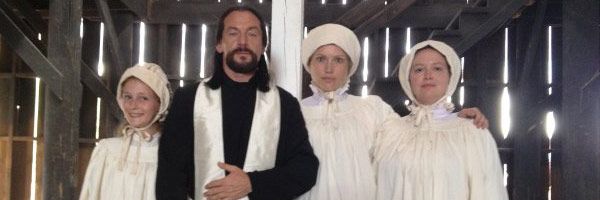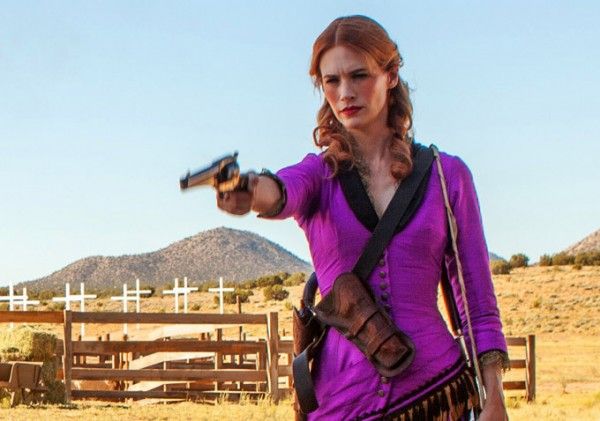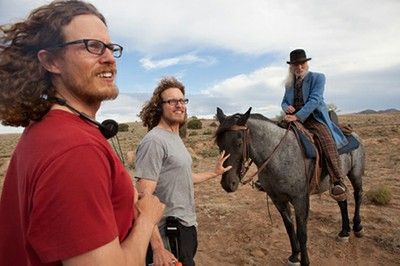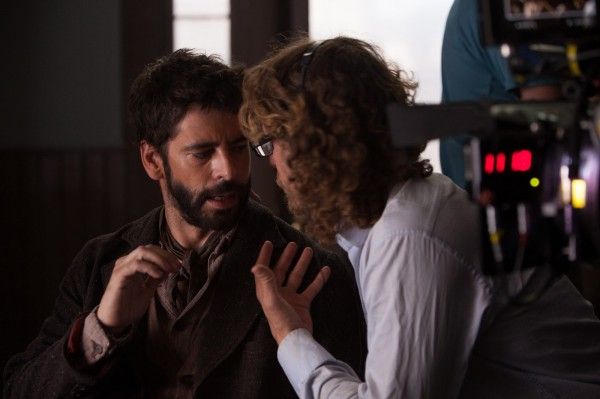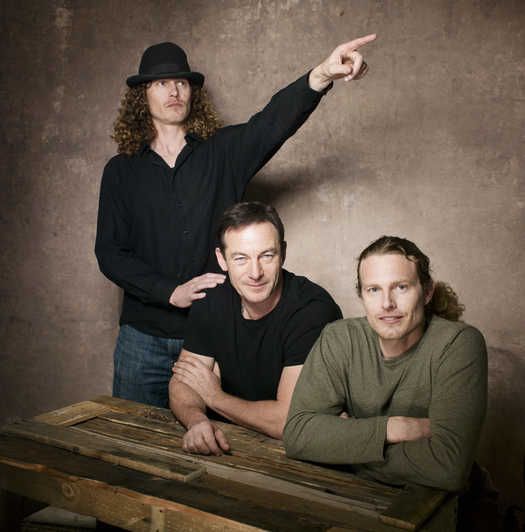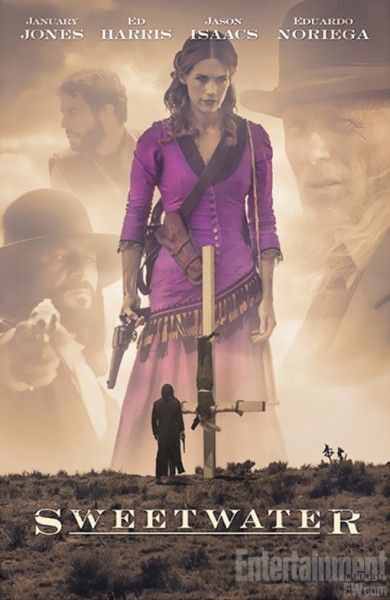In addition to the various small-scale dramas, comedies, and dramedies at the 2013 Sundance Film Festival, directors Logan and Noah Miller unveiled their period western thriller Sweetwater for the audiences in Park City. The film stars January Jones as a woman in the 19th century west who runs up against a flamboyant and dangerous preacher (Jason Isaacs) and a rambunctious sheriff (Ed Harris) when her world is thrown into chaos.
While in Park City for Sundance, I had the chance to sit down with Logan and Noah Miller and Isaacs to discuss the film. They talked about how they became involved with the project, the massive amount of input Isaacs had into crafting his character, what kind of material influenced Isaacs’ work, his chemistry with Ed Harris onscreen, how the script developed throughout production, and more. Hit the jump to read the full interview, and click here to read my interview with Jones regarding the film and her work on X-Men and Mad Men.
Collider: Since our readers are probably pretty unfamiliar with the project at this point, could you tell us how Sweetwater came about?
LOGAN MILLER: Well the script was sent to us by our DVD distributor on our first movie, and they brought us on to rewrite it. So I guess it started there, and then ideas started cropping up and we ran with it.
NOAH MILLER: Yeah, you know I mean when you’re hired to rewrite something you have to make it your own, and probably 30 or 40 drafts later we were shooting. So we originally rewrote it, sent it to Ed Harris, he called us the next day and said “Hey guys I’m in,” and then he met with the producers a couple days later and they said, “Hey how you doin?” and he said, “Fine,” and then they said, “Well what do you think about the script?” and he goes, “I really like what the bros have done but if they’re not directing, I’m not interested.” So that cemented us, or nearly cemented us as the directors. Then you bring on actors and actors have—you know January, Ed, and Jason all had wonderful ideas so you continue to write and rewrite.
LOGAN MILLER: (to Jason) You can speak to that a little bit.
JASON ISAACS: Well I don’t want to interrupt. I read the script which was great, but I had some questions about the part because he was a preacher, and he also was raping and killing and stuff, and I wondered why he was doing this stuff. I’ve been offered a lot of villains in my life and most of them are very badly written things, and I say “No” because they’re doing stuff so that the audience doesn’t like them. They wouldn’t really be dong it. So I just wanted to meet the boys and ask them a couple of questions, that turned into an all-day session in a restaurant.
LOGAN MILLER: Five hours (laughs).
ISAACS: It started with me saying, “Well does he believe in God? If he believes in God, then is he doing this because God told him to or is he doing this knowing God will be angry? Or does he not believe in God, in which case he’s just conning the public and then doing what he wants to line his own pockets?” And they went, “Ah, good question. We think he believes in God,” and I said, “Okay, is that something we can reflect?” and they went, “Give us a few days.” They rewrote the script entirely and read some other books and watched a lot of movies, and they sent me a book called Under the Banner of Heaven, which really rocked my world. It’s so horrifying and shocking, and then I had to do a double take and realize he was talking not just about the past but about contemporary America. Then I had some suggestions for them, I said, “If we really want to go down this road, the rewrite’s great but if we’re saying this guy is a polygamist why don’t we have a bunch of wives?” and they went, “Great! And one of the wives can be his daughter!” and I was like, “Oh fuck” (laughs).
So it just grew and spiraled, and I hope and I still think that at no point did we cross over into doing things that are purely one-dimensionally villainous for the sake of the audience, because once you have divine revelations and a cult of people following you, you then feel that you have license to do whatever you want. To not only rape, kill, acquire in service of something greater, but to feel justified in doing so. And what I loved about the story then is that he’s not this set character, that’s who we find, but then Ed enters the picture, and like all great stories it starts with a catalyst. Ed Harris comes in with his mischievous eyes and his troublesome personality and life as on screen and fucks with me, and my ego is badly bruised by it. Then the prophet is challenging God and wondering why he’s been so humiliated, and conveniently as happens with people who are mentally ill, the voices come to him and say, “Ah, the answer is to go and do X, Y, and Z.” So it felt to me like an interesting and compelling and enormously dramatic journey, and that’s because these boys are endlessly inventive and creative and prolific. That’s the other thing about writers, they can have great ideas, but the two of them are greater than the sum of their parts. I don’t know how much energy they would have separately, but together 1 + 1 makes 5. They do shit, they get shit done well but also at a pace that you don’t find often.
I wanted to ask about your character specifically. He’s so much fun to watch, and I was wondering if you had any specific influences in crafting this sort of over the top character?
ISAACS: Well it was Under the Banner of Heaven and I looked at the demographics. I was trying to find a voice, and actually originally Logan and Noah had asked me if I would do English, and I think that was partly because they had seen me in The Patriot and liked that performance, and I felt the comparisons would be too easy to make. And so we came up with a hybrid accent, because there were a lot of Irish settlers so I said, “Can I do Irish?” and they said, “We don’t like Irish. An Irish preacher’s too obvious,” so we came up with a voice which was an Irishman—because there was a massive influx who had gone to the northeastern states—drawn to Utah, been kicked out of Utah because he still wanted to have multiple wives when that was banned. So specifically, as well as the look, there was a voice that to me, at least I hope the audience will pick up on it, was rich with the places he’d been and the life that he’d lived. And the rest of it comes from the script and their feverish, twisted imaginations.
I know you’ve said before that this is more of a thriller than a Western. Did you have any specific influences you were going for style-wise or for the tone?
NOAH MILLER: We keep being asked that question and it’s a great question but—
LOGAN MILLER: I think you’re informed by, subconsciously and consciously, everything that you’ve seen and everything that you’ve experienced in life, but for us it was more conversations with our cinematographer saying, “We’d like to use mostly wide angle lenses to put the characters in landscape. We want to capture this dark, vast, stunning and forbidding landscape,” but not so much like, “Oh we need to pay homage this movie or that movie.”
ISAACS: You know who your influences are, genuinely and seriously? Each other. Other people look outside themselves often—not that you didn’t study and teach yourselves—but your sounding boards are each other. Most people don’t have that. Your taste is grown from you being a unit.
NOAH MILLER: Yeah I’ll buy that. And also, when you’re writing—at least when we write—you’re envisioning the whole movie. There was always a—cause it is very abstract and it’s very personal, we’re not the guys who go, ”Hey they did this in this movie, let’s do that here.” It’s really a conversation and a collaboration, so you have your vision, you articulate it to your cast and to your department heads, and actors will come up with brilliant ideas that will influence the shot.
ISAACS: There were things like you’d go, “Is it gonna work that you have this serious emotional scene and then someone gets a gun barrel shoved up their ass and shot with it?” Cause there were a number of times when people asked you about tone, I asked you about tone, and you use each other as your first yardstick: “We’ll never get away with that. No that will fit. That won’t fit. That’ll take people out of the movie.” You’re not going, “Oh it’s okay because it’s like Kubrick or Tarantino or John Ford,” you look at each other and you go, “Is this the story I wanna tell?”
You and Ed Harris seem to have a really great rapport onscreen. Were you guys friends beforehand or did that develop onset?
ISAACS: No, he’s just a magnificent actor so there was a sense of goodwill onset. Depending on the kind of project it is, particularly if there’s money involved or fame or giant stars with big trailers, there can be a tension and a level of hierarchy that can bleed into the scenes themselves; not always but sometimes. But when you’re making a film like this and it’s dusty and it’s hot and everybody’s dirty and you know you’re not gonna get in an air-conditioned SUV and go back to a big trailer where they’ve got ice cold drinks for you. You’re out making a film together and I knew that Ed was godfathering the film into existence and it all wouldn’t have happened without him, [so] that evens the playing field, and then he’s a magnificent actor and director actually, so he knows that everybody’s as good as the other people in the scene. So he’s in the moment with you.
There are people—I won’t and shouldn’t name them—but there are actors who like to do their close-ups to nobody; they want the other person to go home, and then they don’t turn up for your close-up. As a proper actor, he’s opposite you he’s looking in your eyes, his eyes are dancing with mischief and danger, and he’s listening, and it makes my job so much easier, it makes all actor’s jobs easier if the other people in the scene are wonderful and present. And then of course when you’re making a film like this, you really are on a horse or you really are in the desert, you’re not doing what’s happened to me many times in my life which is it’s a green screen and they say, “A spaceship is landing” or “A broomstick is flying at your head.”
I wish we had had more scenes together because we enjoyed it. The closest analogy I can think of is sport because I play tennis: you get on a court with somebody and you have no idea if they’re someone who just wants to ball you, they wanna have a match, you’re gonna be better than them, they’re gonna be better than you. And the pleasure when you get on the court and within a few strokes you realize, “This is gonna be a great day’s tennis. We’re really well-match,” and when you start acting with somebody like Ed and he suddenly stands in front of you and the scene comes to life, there’s a thrill. It’s rare, I hope we get to do it again.
As an audience member, it was a lot of fun to watch.
ISAACS: Funny enough, I remember the feeling my first day on Harry Potter where my first take, I think, was a scene with Richard Harris, who I also got on very well with because I went to drama school with his son Jared. Then as soon as they said “Action,” he became this incredibly powerful adversary. His eyes were alive and there was a light coming out of them and I felt pierced and I felt drilled by them, and I felt a similar thing with Ed.
They talked a bit about developing the script with you as you headed to production. Did the script change very much once you got on set?
ISAACS: Enormously. Unrecognizable; certainly my bits of it. He’s an entirely different character, he has different concerns, he’s a polygamist preacher who has divine revealtions and he becomes more poetic. And also sometimes they go, “We don’t have any dialogue to cover you walking around the sheep,” so there were little bits which were improvised. Apart from the fact that they’re great writers and the dialogue was wonderful, they also created an atmosphere of freedom where if something occurred to you it was absolutely fine too. They weren’t gonna come out from behind the camera and go, “What the fuck did you do that for?” They would listen and if they liked it they would come out full of enthusiasm. Which is a very rare thing.
What did shooting everything on location bring to the film and to your role?
ISAACS: Well you know acting’s a very simple job, it’s just sometimes quite hard to do, you just have to try to be that person in that situation. So when you really are in the middle of the desert on a horse and you’re in the right clothes and pull up to a ranch house and the sun’s blazing, you don’t have to pretend those things. You shoot in a big green screen box and they say, “You’re on a ship and there’s a big wave coming towards you,” it’s much more challenging, it’s what my job is meant to do. It takes away a hell of a lot of the challenge if you’re in the right environment. Also not just in the moment, but also if you’re trying to imagine what it’d be like to live that far from any authority, for instance. This town is a place run by me, they’re all my disciples, and somebody comes into town and causes trouble. You can see 50 miles in every direction, you can very easily imagine that there’s nobody coming to save you.
Where did you guys shoot this?
ISAACS: We shot in New Mexico. A bunch of places outside Santa Fe.
Did you have complete trust in the directors with regards to the level of violence in the film?
ISAACS: I’ve done lots of fighting and violent things before in films and obviously this is a very, very violent and brutal time and my guy is uncompromising about it. I would never do anything that wasn’t safe, it’s got to look dangerous but having been around as long as I have, it never needs to be dangerous. A couple times I’ve worked with amateurs, one time I worked with a karate champion and the director came from documentaries and he didn’t know that if you put the camera behind someone’s head you can miss them by a foot. I was about to swing a bucket full of sand at this guy’s face and the director said, “I can see you missing him,” and I said, “Well you’re gonna have to move the camera or turn us around,” and he said, “No just get a bit closer.” This karate guy said “Just hit me, it’s fine I do full contact all the time,” and I said, “I’ll take your fucking head off, I’m not gonna hit you,” and it got a little ugly on set. So you can do violence just like you can do dancing, just like you do sex, it’s just choreography and if you shoot it right, you’re not really doing it.
Click here to catch up on all of our 2013 Sundance Film Festival coverage thus far.

